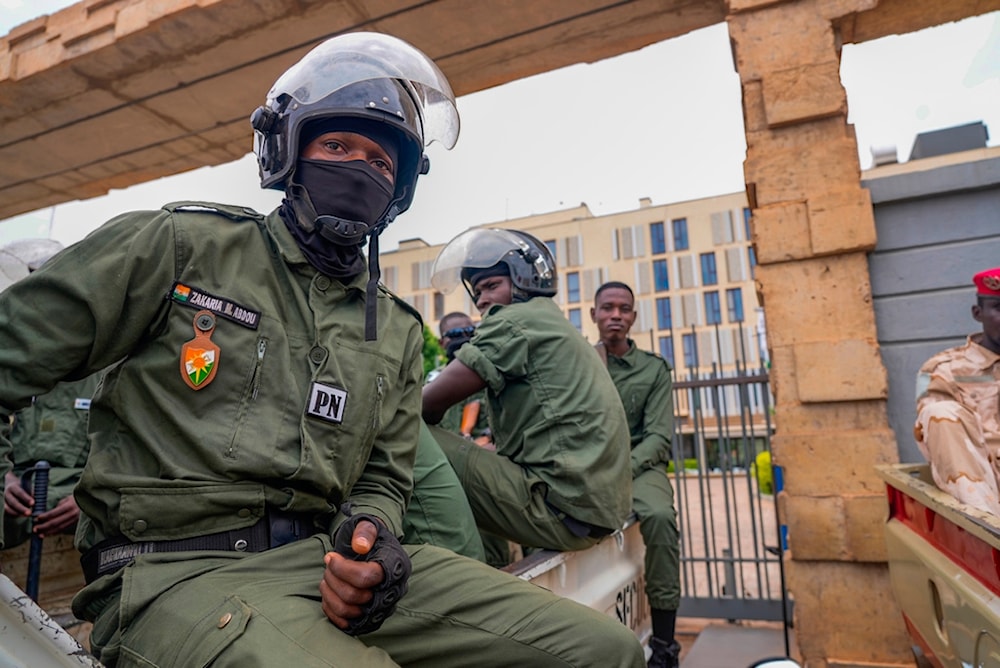Niger announces review of military deals with Western powers
The newly established leadership in Niger assumed control of the landlocked country on July 26.
-

Nigerien police officers sit outside the customs offices in Niamey, Niger, on Aug. 21, 2023 (AP)
Nigerien media reported on Tuesday, citing a letter from the Nigerien Ministry of Foreign Affairs to the diplomatic representatives of countries that maintain military bases in Niamey, that the Nigerien government is set to announce plans to reassess military agreements previously signed with Western countries.
According to the letter, this decision is a manifestation of their dedication to "safeguard" and protect the interests of the West African nation "in accordance with the demands of the Nigerien people."
"A draft memorandum of understanding will be submitted to them [partner countries with a military force stationed on Niger’s territory] to breathe new life into bilateral cooperation," it added.
Read more: Burkina Faso, Niger withdraw from all G5 Sahel association bodies
The newly established leadership in Niger assumed control of the landlocked country on July 26, following the overthrow of former President Mohamed Bazoum in a coup. Since then, they have undertaken various measures to reevaluate relationships with foreign partners.
France completed the withdrawal of its troops from Niamey last week. These forces had been involved in countering a decade-long jihadist insurgency in the Sahel region. But after all this time, they failed to attain any tangible accomplishments, raising questions about the true motives behind the French presence in Niger. The departure came in response to the demand from coup leaders that the French forces leave the area.
Presently, the US maintains a deployment of 648 troops across two bases in the former French colony. In 2017, the Nigerien government granted approval for the deployment of armed US drones to target militants as part of the Sahel counterterrorism mission. Despite participating with France and other Western allies in withholding aid to Niamey in response to Bazoum's ouster, Washington has asserted that disengagement from Niger is not a viable option.
As of September, Germany had approximately 110 soldiers stationed in the uranium-rich nation, while Italy had around 300 soldiers deployed there prior to the coup.
Read more: Sahel countries commit to Morocco's infrastructural initiative
Earlier this month, Niger's military government declared its withdrawal from the European Union Civilian Capacity-Building Mission (EUCAP) and the EU Military Partnership Mission (EUMPM). The announcement included the termination of any "privileges and immunities" granted to troops under these two security agreements.
The EU initiated the three-year EUMPM in March, intending to provide training, logistics, and infrastructure support to Nigerien forces to enhance their capability in countering terrorist threats. The EUCAP mission, launched in 2012 and funded by the EU, aimed to develop Niger's civilian police and security forces.
Nigerien Prime Minister Ali Mahamane Lamine Zeine recently conveyed to Sputnik Africa that the coup leaders are open to collaboration with partners who respect Niamey's sovereignty.
"No one will come and impose anything on Niger. Nigeriens will no longer be able to accept this. We have reached a milestone where no one will ever again come to dictate to us what we must do," the official said in the interview published on December 19.
On another note, the newly established authorities in the African country have entered into a memorandum of understanding with Russia to enhance defense cooperation.
Read more: Niger in talks with ECOWAS over post-coup transition period

 3 Min Read
3 Min Read










